Is SEO dead in 2022?
Well, you tell me. Here’s Analytics data for a client LSEO started working with in July of 2021:

Of course, we know the question, and answer, are more complicated than what increasing website traffic can show you.
First of all, why do people even ask if SEO is dead? Something has to have brought on the question.
If you go and research what digital marketers are saying on forums about SEO being dead (and these discussions are nothing new in 2022, by the way), you’ll see arguments such as “This post that has had amazing traffic and rankings for months is suddenly off page 1,” or “My historically ironclad formula of content publishing isn’t keeping up with the competition anymore. SEO is dead.”
Neither argument tells the whole story.
Let me answer the question right now, though: SEO is not dead. It’s alive, healthy, and vital. I perform SEO tasks every single day and see positive changes for my clients because of it.
But, like anything worth thinking about in life, there are nuances to the question and answer.
Is SEO dead in 2022? No, and I’ll explain why that is.
Why People Have Been Asking if SEO Is Dead
What would be really interesting is if professional SEOs had just started asking if SEO was dead in 2021 or 2022. That would at least point me in the right direction so I could say, “Oh, here’s why they’re saying that. Let me look into this further.”
The truth is, though, people have been asking if SEO is dead for more than a decade.
And yet here we are in 2022, still doing SEO every day (and seeing results!).
What usually drives people to ask if SEO is dead is a website’s increasingly weak performance on Google.
Website owners who do their own SEO see their rankings drop slowly over time, they see their traffic and click-through rates decreasing, and the things they used to do to build backlinks are no longer effective.
If you’re not in the business of doing SEO every day at a high level, then it would probably seem logical to say that these results mean SEO is dead and there is no more point in trying to drive online conversions through the SEO medium, since the largest companies with the biggest budgets win out all the time anyway.
But this misses the point by a long way.
Check out this screenshot I took from Semrush when looking at search volumes for the keyword “is SEO dead”:
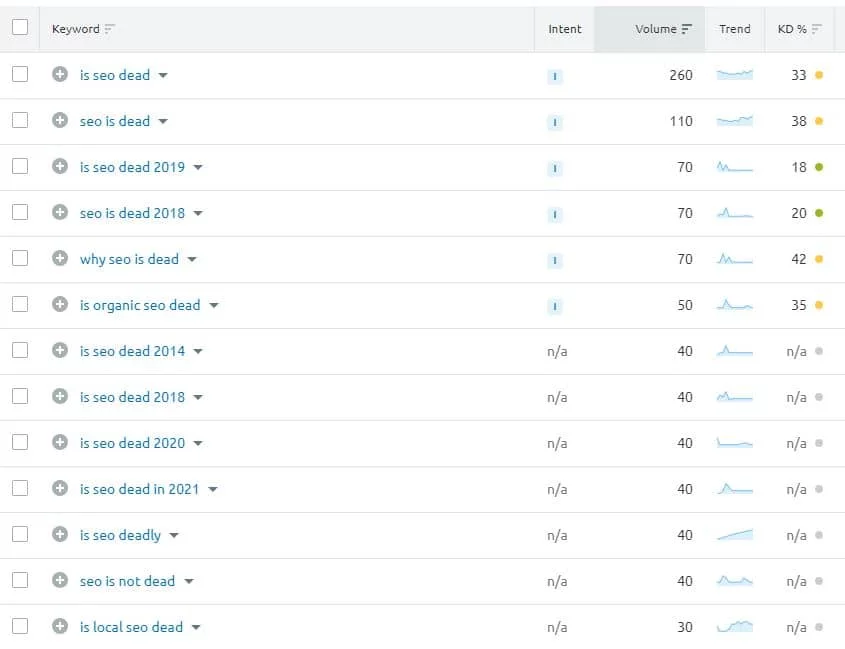
So, we have search volume on the term attached to the years 2014, 2018, 2019, 2020, and 2021.
And I promise you, there are resources out there addressing the question further back than 2014.
If marketers and others have been wondering about the death of SEO for about a decade, we have to ask ourselves what those years have in common.
Well, way back in 2011 came Google’s Panda update, which aimed to filter out low-quality spam websites, such as content farms, in favor of real websites that produced actually useful content.
The Penguin update followed in 2012, which further penalized spam websites that used keyword stuffing and shady link practices.
Google admitted its use of the machine-learning-based RankBrain in 2015, added the natural-language processor update BERT in 2019, and introduced the product reviews and Page Experience updates in 2021. The Page Experience update notably included the Core Web Vitals.
What do you notice about each successive update?
Each one made Google progressively better at:
- Understanding search queries
- Showing users higher-quality search results
Google has shifted gradually to a user-first model in the last decade, leaving all those spammy SEO practices in the past where they belong.
Given all this, it seems that there is a positive correlation between Google improving the way it ranks good web pages and people asking if SEO is dead.
My thought is: if you really believe SEO is dead in 2022 or are at least wondering if it is, then you probably haven’t been optimizing your website effectively lately, in the ways Google says you have to if you want to rank, and your rankings have tanked.
In other words: if you think SEO is dying, you ain’t doing it right.
SEO Is Growing Up, Not Dying
The better way to think about SEO is that, instead of dying, it’s growing up, maturing, and doing a better job of defending itself against scammers.
Just like you could easily deceive a child into thinking that object you had a second ago is now gone forever, black-hat SEOs used to be able to fool Google. They could buy links and use invisible keywords on their pages and rank pretty easily.
But childish things tend to go away as we age, and it’s been the same for Google.
SEO in the late 1990s was a child still finding its way in the world.
SEO in 2022 is an adult who’s pretty much seen it all.
If you want to play nice with SEO these days, there are certain areas where you just have to stay up to date.
If you don’t, your web pages won’t perform well, and you’ll go around calling SEO dead.
Here are some vital SEO factors to keep in mind if you want to rank in 2022:
Focus on Search Intent
If you want your content to perform and deliver an actual ROI for you in 2022, you absolutely, 100% have to focus on search intent.
I mentioned Google’s 2019 BERT update above. The update allowed Google to understand natural language better and to put context to search queries.
That means that Google understands what is meant by a query rather than just how the individual words are defined.
The term “running shoes” means something subtly different from “best running shoes.”
The intentions are not the same, despite the terms being so similar.
Here’s the first search:
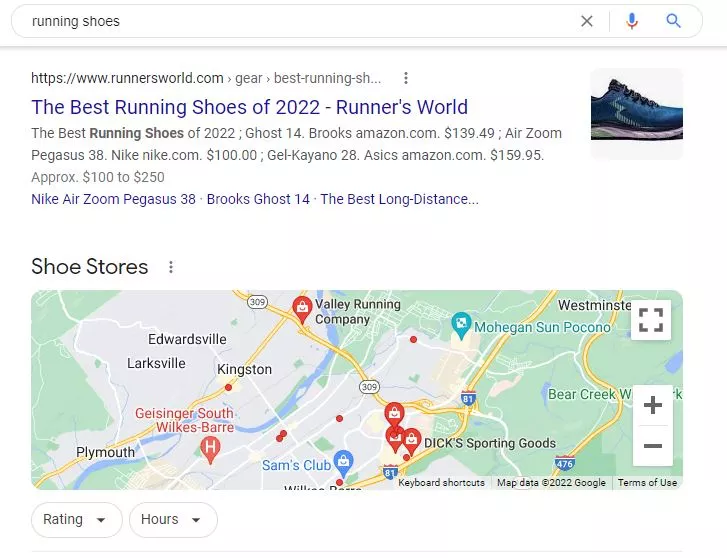
And here’s the second one:
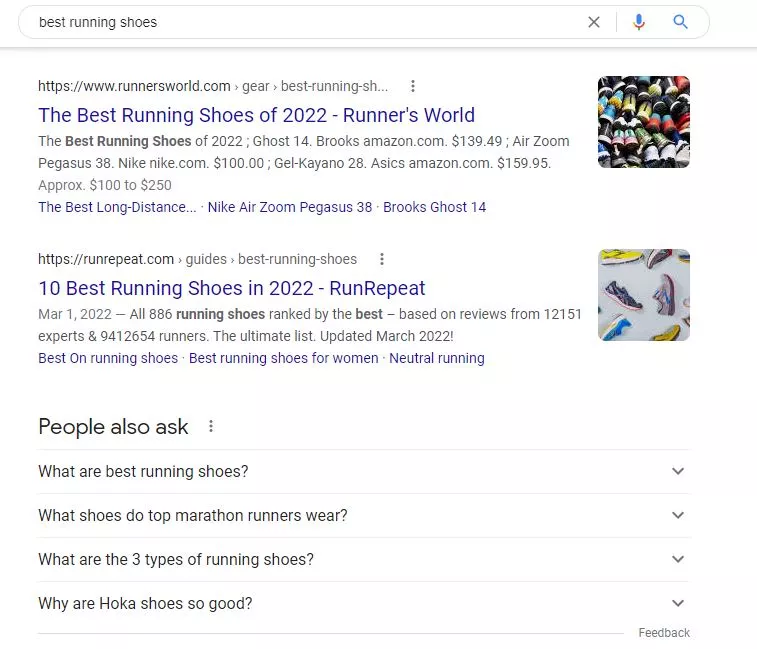
The intent of the first search is to browse running shoes to see what’s available. We don’t know if the person plans on buying or not. Therefore, Google gives me a mixture of content and a local pack showing shoe stores.
The intent of the second search is to compare running shoes because the searcher doesn’t know which type to buy. It’s basically all content there, specifically roundup posts that rate running shoe brands.
The people searching for those terms are different personas. One’s here to browse, while the other is getting ready to buy. They are people at different stages of the sales funnel.
Since it knows about search intent and what kinds of content to show for keywords with specific intent, Google isn’t going to rank random content just because it’s related to the keyword.
If throwing seemingly related keywords into your content was your go-to method for ranking in the early to mid-2010s, and it isn’t working anymore, that doesn’t mean SEO is dead.
It just means you have to improve to keep up with the changes Google has made.
I’d like to refer all content creators out there to our guide on content marketing funnels to get a better sense of how to produce content for users in each stage of the funnel.
By the way, as an aside, don’t spread yourself too thin with your content topics. Write about your niche deeply and well. Domains that publish content about everything and anything don’t scream “Page 1.”
With the rise of the long-tail keyword and the completely drilled-down searcher intent of ranked content in 2022, you’ll have a better chance publishing about one subject in great detail.
Our guide to topic clusters will show you the best practices for doing this.
If you can get all of this right, you may be able to see some lift on your content rankings, and you probably won’t say SEO is dead anymore.
Build Backlinks the Right Way
Another reason people might have been asking if SEO is dead for the last few years is because they can’t get backlinks like they used to.
Google’s been getting better at looking at spammy backlinks for years, but the search engine strengthened these efforts with 2021’s link spam update. In that change, Google neutered the SEO value of spammy links, though it didn’t actually penalize websites that engaged in spammy link building.
Look, we can simplify things right now by just getting the idea out of our heads that spammy link building practices are going to work for you in 2022.
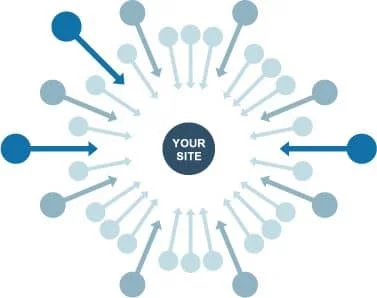
LSEO has written extensively about why the old, black-hat style of link building is wrong and which link building strategies you should be employing instead.
Don’t bother with leaving your URL in blog comments, don’t pay for links, and don’t use link farms.
Put the work into broken link building. Reclaim your own broken backlinks to give them a new life. Become a source on HARO.
Basically, generate awesome content that, with the right kinds of outreach efforts from you, will earn those backlinks that you need.
If your link building efforts have been anything other than natural and useful, don’t complain about SEO being dead.
Become a Technical SEO Wizard, or Find an Existing Wizard
Last, if you think SEO is dead in 2022 because you have good content and decent backlinks but still aren’t ranking well, it may be time to see if your website’s technical SEO aligns with what Google wants to see.
Now, sure, there are all the best practices of technical SEO that you have to know about already, but have you brought your site completely into the present?
Have you optimized for the Core Web Vitals? Have you created an XML sitemap to help Google find all your pages? Have you gone the extra mile and added structured data that will give certain pages and posts the edge over your competitors’ content?
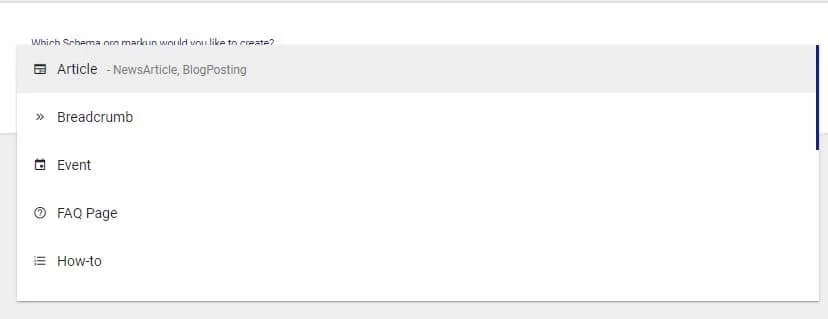
As intimidating as it can seem to go into your website to create redirects and rewrite old title tags and new meta descriptions and resubmit sitemaps to Google Search Console, these elements are just the basics of an SEO-optimized website.
We can’t blame Google or call SEO dead if we can’t rank web pages with lots of broken stuff.
Don’t worry, though: LSEO has created a complete technical SEO checklist to give you an idea of all the things you’ll need to address.
If it seems a little complicated, know that we can team up with you to fix it all the right way.
Is SEO Dead? At LSEO, We Know It Isn’t
So, is SEO dead in 2022?
Let me restate the point of this entire post:
No, SEO is not dead. It isn’t dying. It isn’t going to die.
It’s just evolving, and websites need to evolve with it.
With Google going all-in on its user-centric, page-experience-centric model of showing content to people, there are just some methods that won’t work like they used to.
Website owners who don’t want to change will call SEO dead.
We don’t believe SEO is dead here at LSEO. Our clients don’t, either. They see Google is changing and expect us to do whatever is necessary to continue promoting their brands online.
SEO is more alive than ever before. If you’d like to work with an SEO agency with that kind of approach, give us a ring. We got you.
